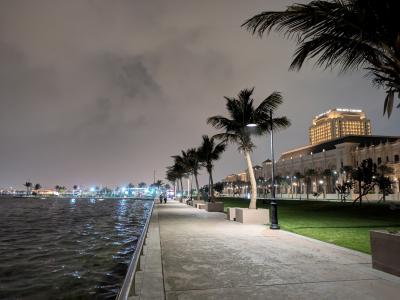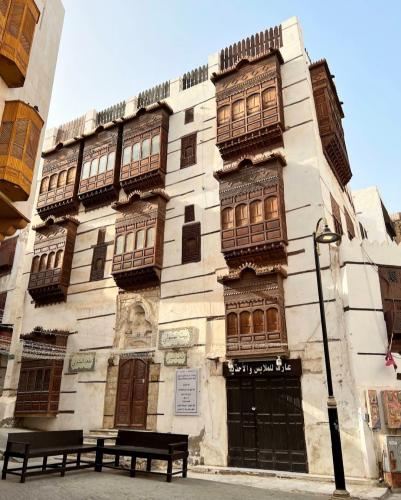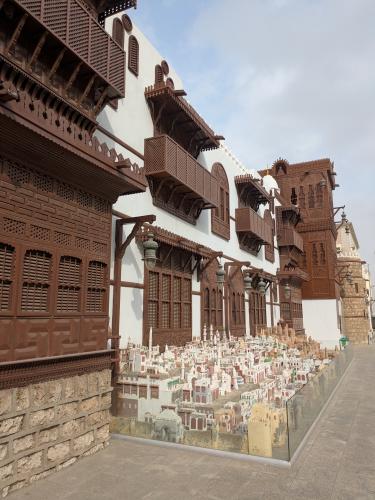Spending 48 hours in Jeddah: Not ready for prime time

JEDDAH, Saudi Arabia — On the aeroplane to this Red Sea port city, I noticed the absence of Saudi Royalty. Apparently, they do not fly on budget airline WizzAir. Half the plane was filled with groups of men wearing Irahm clothing (two towel-like white pieces of cloth without seams, hems or buttons) which made me wonder if I made the right decision to travel to Saudi Arabia during Ramadan. In my head, my friend’s voice repeated, “Maybe you will experience something you wouldn’t, outside of Ramadan.”
I rarely order a transfer from the airport to the hotel, but after my research, it seemed like a good idea. As we left the airport, many unlicensed cab drivers angled for my business. There was no option to line up for professional cabs, as is common at most airports. My driver, Hamid, handed me a water and a yogurt drink, and off we sped to the hotel.
I booked a Western hotel on the centrally-located Jeddah Corniche for the possibility of a lunch option during my stay. The Corniche has a wonderful view of the King Fahd Fountain that shoots seawater 260 metres into the air and is illuminated at night. It is the largest fountain of its type and began operation in 1985 as a gift from the former ruler of the Kingdom.
For over the last ten centuries, this port city has been an entry point for billions of pilgrims on their way to Mecca. These pilgrims would pass under the Bab Makkah gate of Al Balad, Jeddah’s old city and the main attraction for visitors. Al Balad is lined with houses that are made from Red Sea coral with striking brown wooden balconies.
Some of the houses are now museums, like Naseef House, the former King Abdul Aziz residence. It features free entrance and a helpful staff offering quick tours. My guide was happy to show off the steps that were built for horses and camels so 1920 messengers would not have to climb four stories when they brought messages to the King [during the 1920s].
Down the street is the privately-owned Matbouli House Museum which was a traditional Hijazi merchants’ home and is over 400 years old. The house is filled with old furnishings, with numerous carvings and designs on the walls. The uneven floors and steep staircases give you a chance to experience what it was like in the old city.
I asked Omar, a Jeddah native whose parents moved there from Indonesia before he was born, why the city was so crowded as we broke the fast together around 6:30pm at Wong Solo, a favorite restaurant among Indonesian pilgrims. He explained that pilgrims do a “two-for-one”; they choose to visit Mecca during Ramadan because they are focusing on fasting anyway, so it’s a good time to help them get through the period by traveling to the spiritual homeland. It can be difficult to fast in their home countries at times especially if the country is not majority Muslim.
The place was filled with pilgrims from Indonesia. I had the Ayam Bakar which was Indonesian grilled chicken with rice, fried tofu and a peanut sauce which made me want to visit the island of Java where the owner is from. I also enjoyed an Es campur, an Indonesian sweet dessert drink made with coconut, shaved ice, condensed milk and grass jellies, a popular drink when breaking the fast.
I discovered Uber was the best way to get around because public transportation seemed absent, and the large city is not walkable. Two of my drivers were from Mecca and worked in Jeddah because it was more profitable and easier to drive. The topic of religion came up, as it often does. When drivers asked if I was a Muslim, the conversation would end with “Inshalla” which translates to, “God willing, my passenger will become a Muslim.” “You will receive 40 virgins when you die,” said Abdullah on our way to the airport. Although that sounded promising, I was not ready to convert.
There were a lot of things under construction throughout the city, but a lot of the structures seemed to be remnants from the 90s. Al Balad was the nicest part of the city I experienced. “In 10 years, we will be better than Dubai,” promised Abdullah.
As he dropped me off at the small, crowded and struggling international airport, I thought, “Yeah, maybe in another 10 years.”
JLB


© COPYRIGHT ITALIAN INSIDER
UNAUTHORISED REPRODUCTION FORBIDDEN


